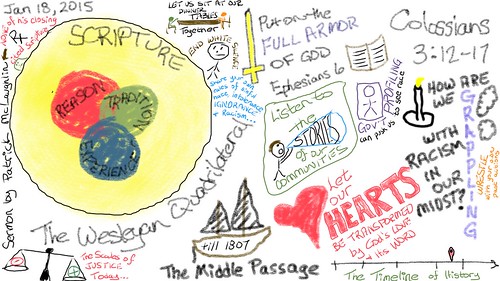Sketchnotes About a Sermon on Racism in America
These are my sermon sketch notes from January 18, 2015, at First United Methodist Church in Manhattan, Kansas. The sermon was preached by Pastor Patrick McLaughlin, who is Associate Pastor of Missions & Outreach at FMC. The title of the sermon was, “Would Jesus Call the U.S. a Racist Society?” This is part of a series titled, “Pastor’s Press Conference,” and archived versions of sermons are available online. The initial Bible passage Patrick started the sermon with was Colossians 3:12-17:
Therefore, as God’s chosen people, holy and dearly loved, clothe yourselves with compassion, kindness, humility, gentleness and patience. Bear with each other and forgive one another if any of you has a grievance against someone. Forgive as the Lord forgave you. And over all these virtues put on love, which binds them all together in perfect unity. Let the peace of Christ rule in your hearts, since as members of one body you were called to peace. And be thankful. Let the message of Christ dwell among you richly as you teach and admonish one another with all wisdom through psalms, hymns, and songs from the Spirit, singing to God with gratitude in your hearts. And whatever you do, whether in word or deed, do it all in the name of the Lord Jesus, giving thanks to God the Father through him.
While these issues are extremely important and timely for Christians in the United States to consider today given our recent events, I was surprised that the “closing prescriptions” offered by Patrick did not include any citations or references to Scripture. Because of this, his message overall was not differentiated from secular “calls to action” for social justice which we hear from different non-profit groups and organizations. The message itself is and was good, but it was essentially “missing Jesus.”
In his sermon, Patrick read verses from Colossians and Ephesians, but his message sounded and felt like more of a history lecture on social justice rather than a sermon in a mainline church. In the sketchnotes, I inserted the words “Let our hearts be transformed by God’s Love and His Word.” Patrick emphasized the importance of us loving each other, and put the focus of action on what WE as human beings could and can do. This made his message strike me as somewhat Gnostic, since it did not emphasize our need for Christ and the idea that WE cannot do anything (including change race relations in our communities and culture) without God’s power and actions.
I think this was the first time I’ve heard a pastor give a personal, racism-based “confession” during a sermon, and I think there was value in this. It took courage for him to admit mistakes he had made as a youth, which particularly focused on using the “N word.” I totally agree that we need to be having dialog within our churches and our communities about how we can constructively move forward with improving race relations. Patrick’s suggestions about “listening to the stories of others in our communities” and “sitting down at the table to eat together” particularly resonated with me. As a Storychaser, I especially agree with the first one, but the second one is an important strategy I don’t think we discuss or utilize nearly enough to promote understanding and the overall strengthening of relationships.
From a technical standpoint, I was able to use a stylus for these sermon sketchnotes (unlike last week) and again used the iPad app ProCreate. I exported my finished sketchnote as an image to the photo roll and uploaded it to Flickr, and also exported it as a video. I imported the video into iMovie for iPad and added voice narration, doubling the time for the playback so I had more time to talk. Lastly I uploaded the combined video using YouTube Capture. Here’s the narrated version:
I added this to my Flickr set for visual notes / sketchnotes. I was visiting FUMC in Manhattan, Kansas, today with my parents. I’m a member and elder at First Presbyterian Church of Edmond, Oklahoma.
If you’d like to learn more about sketchnoting, see my resources on visual notetaking in “Mapping Media to the Curriculum” and my eBook single on “Visual Notetaking.”



Thank you again SOO much Wes! This is powerful work and I appreciate your commentary! Especially about not emphasizing the pointing us back to Christ aspect. I sometimes assume too much that the religious audience hears that message implicitly and will make the connection themselves take the invitation I made to join the bible studies that I pointed to at the end, so they might come to their own scriptural understandings of the lessons.
I see that as a personal blind spot, likely fueled by a want to make my work look “less Churchy” and more accessible to a “Done”, “None” or “nominally Christian” audience who might say, “What does it mean for a pastor to be saying these things that I also believe?”
Thank you again and I hope to be blessed with this gift again!